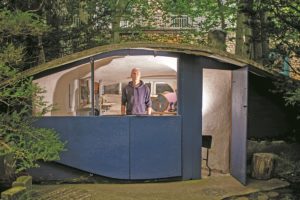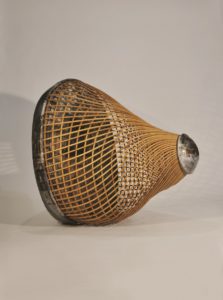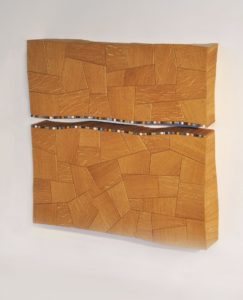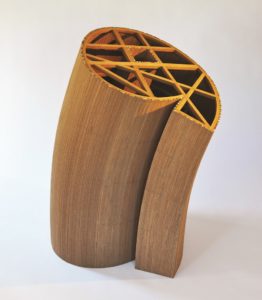It has been said that if you let an artist work long enough, he’ll eventually start working abstractly. If true, this certainly applies to Rick Wrigley, who says his career over the past 40 years can be broken into three phases: furniture maker, house builder, and now sculptor.
Phase one: Wrigley grew up in Arlington, Va. — a place he calls “affluent America” — but left as soon as he graduated from high school. While his peers went to college, he traveled around the United States for six months in a “hippie van.” He apprenticed for a few years with a classically trained cabinetmaker before enrolling in the School for American Crafts at the Rochester Institute of Technology, graduating with a B.F.A. in furniture design.

Wrigley opened a studio in New Rochelle, N.Y. During that time, he became an important member of the studio furniture movement. He was invited to exhibit at the Smithsonian Museum’s Renwick Gallery in Washington, D.C. (where he has a piece in the permanent collection); the Montreal Museum of Fine Arts; the Silvermine Arts Center in New Canaan, Conn.; and the Museum of Fine Arts, Boston.
Phase two: After moving to Provincetown in 1999, Wrigley started focusing on architecture. He sees the progression as natural. “If you’re designing furniture, it’s not that big a step to designing a house,” he says. “It’s the same kind of manual skills: drawing, woodworking, and other mechanical abilities. You’re just visualizing something you’re inside of, instead of looking down at it.”

He built four houses and a studio, and designed two additional houses. But “after 20 years of designing and developing houses,” says Wrigley with a laugh, “I’ve had my fill.”
Phase three: Since 2014, Wrigley has been making sculptures. His approach is process-driven, not conceptual. “I’m grounded in the making of things,” he says, with a focus on the “formal elements of design.”
The difference, though, between a chair and a sculpture, is purpose. “A table has to be a certain height. A chair has to be comfortable. There are a lot more restrictions with a chair,” Wrigley explains. “That kind of work was challenging and interesting for me, but now it’s more interesting to be free of that. The kind of spontaneity that sculpting allows is a different way of working.

“For years I’d do drawings measured to a 1/64 of an inch,” he continues. “Once you did the drawing, there was little opportunity for change. The client had signed off on it.” Now he sketches with crayon or charcoal.
One gets the sense that a great weight has been lifted from Wrigley. “It’s all very intuitive for me,” he says. “It’s close to 50 years of working with my hands. And presenting myself with a challenge to make something. I’m not thinking about it intellectually. It’s a different approach.”
Though all artists dream that a New York City gallery will discover them, “At this point in my life, I’ve learned that the rewards from that kind of publicity are limited,” Wrigley says. He is 65, which he says is “frightening.” His mother thinks he retired when he moved to Provincetown in 1999.

“I don’t feel confident,” says Wrigley. “I’m starting something brand new. It’s interesting and challenging and a little scary. It’s all about spending the day doing something that’s enjoyable and rewarding — just being in the studio. Sculpture is a really difficult road to go down. I’m not going to be another Ai Weiwei,” he says, referring to the conceptual artist exhibited seemingly everywhere at once. “It’s all about the work every day. The idea that it can be exhibited is secondary.
“I’m just not happy if I’m not doing something with my hands,” continues Wrigley. “What I’d really like to do is work that takes less time to build. A commitment to hundreds of hours of work — I naturally gravitate to that kind of work because it’s what I’ve done in the past. To be able to experiment with work that takes less time would allow for a little spontaneity.”
Wrigley gives a little shrug. He’s not comfortable talking about his artwork. He’s more comfortable using his hands.
Master Builder
The event: Works by Rick Wrigley, alongside “Forrest Williams: A Retrospective”
The time: Friday, Aug. 13 through Sept. 15
The place: AMP Gallery, 432 Commercial St., Provincetown
The cost: Free
